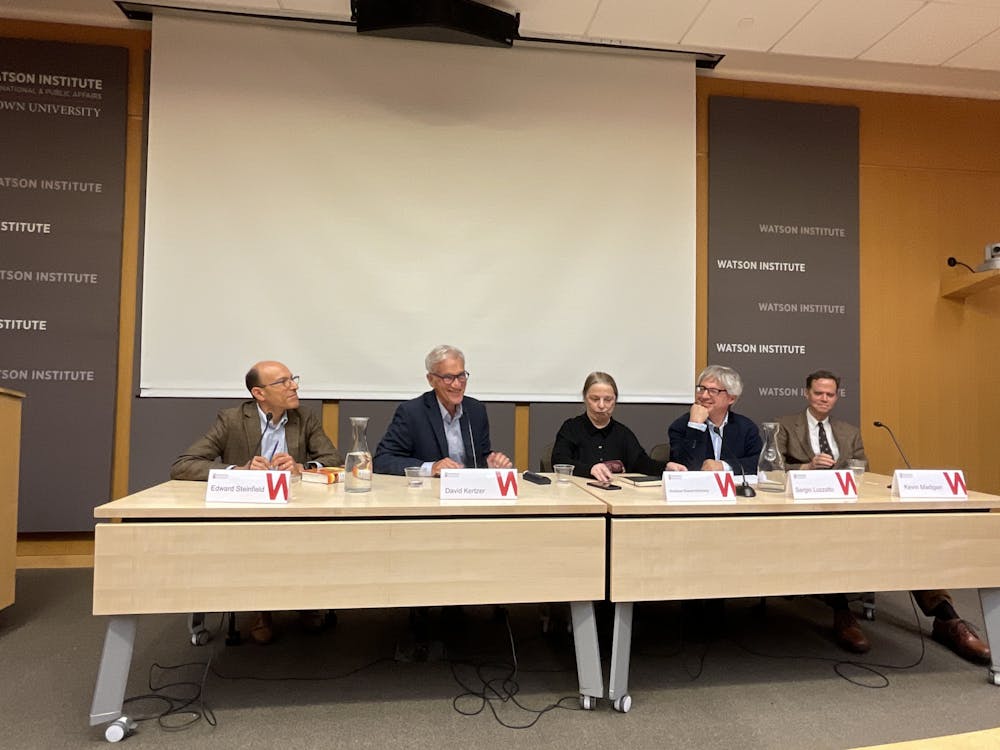New York Times best-selling author and University Professor David Kertzer ’69 discussed his book about the role of Pope Pius XII during World War II and his sometimes controversial relationship with Hitler and Mussolini at a Thursday evening panel hosted by the Watson Institute for International and Public Affairs.
Kertzer, a professor of social science, anthropology and Italian studies, used newly opened Vatican archives for the book,“The Pope at War: The Secret History of Pius XII, Mussolini and Hitler.”
At the event, Kertzer discussed his book with University of Connecticut Chair in Modern Italian History Sergio Luzzatto, Harvard Professor of Ecclesiastical History Kevin Madigan P’19 and Brown Chair of Italian Studies Suzanne Steward-Steinberg P’19. The discussion was moderated by Edward Steinfield P’23, director of the Watson Institute.
While Pius XII had been characterized as both the “Jews’ Pope” and “Hitler’s Pope” by different scholars, Kertzer’s criticism of Pius XII created “the definitive book on the issue,” Luzatto said.
In his introductory remarks, Kertzer discussed the background of his book and his attempts to access the Vatican’s archives.
“There’s been a great controversy over the silence over the wartime Pope Pius XII and his actions and inactions during World War II, and the fact that he never spoke out against the ongoing attempts to exterminate the Jews of Europe,” Kertzer said, adding there was “a lot of pressure on the Vatican to open their archives” before they were opened in 2020.
Kertzer, who traveled to Italy in early March 2020, was delayed in accessing the archives due to early COVID-19 lockdowns in the country announced just days after his arrival.
But in June 2020, one of Kertzer’s colleagues based in Rome was able to access and digitize over 8,000 pages of the archives and send them to him, he said.
The archives were filled with then-unknown stories about Pius XII’s controversial relationships with World War II-era Axis leaders. For example, Kertzer “discovered that about five weeks after Pius XII became pope,” he said, “Hitler sent his personal secret envoy to enter secret negotiations” with him. Those negotiations remained secret for 80 years until discovered in the archives.
Based on the newly uncovered archives, Kertzer wrote the narrative-driven book, which earned praise from the panelists for its prose and relevance as well as Kertzer’s depth of knowledge.
Steward-Steinberg praised the book, saying that it is “not just about secrets that get revealed” but is also “incredibly well written.”
Luzatto also highlighted Kertzer’s historical expertise and precision, describing his background knowledge as his “competitive advantage.”
Madigan continued the panel by addressing criticisms of Kertzer’s book, remarking that “there is a kind of hostile and adversarial and sometimes even venomous quality to the writings of (his) critics.”
In response to criticisms that the book offered “no new findings,” Madigan characterized the complaints as “work(s) of denial” if not acts of “bad faith … deployed to conceal uncomfortable truths and to hide an extra-historical agenda,” he said.
Kertzer closed the discussion by underscoring the controversy surrounding his book, noting that around a week after the Italian version of the text was published, the Vatican daily newspaper dedicated a full-page spread to denouncing the book.
During the reception following the discussion, panelists continued to praise “The Pope at War.”
“This is a really interesting book,” Steward-Steinberg told The Herald. “The story is really well written, and it’s compelling.”
Steinfield said to The Herald that Kertzer’s work is “exceptional scholarship” that discusses “issues that are … relevant today. This is exactly the kind of program we always love to hold.”

Neil Mehta was the editor-in-chief and president of the Brown Daily Herald's 134th editorial board. They study public health and statistics at Brown. Outside the office, you can find Neil baking and playing Tetris.





